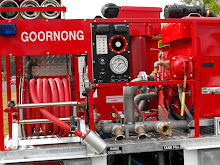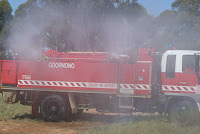The class of 2010 minimum skills has now been completed and was a resounding success. All participants have successfully completed both the theory and practical sessions. Congratulations to all participants who showed a willingness and enthusiasm which made the instructors and assessors jobs just that little bit easier. Here are a few happy snaps of the day. A big thanks to all who participated, the instructors Brett and Peter. Also a thanks to Denis and Tim for their tireless efforts to get the crews up to fantastic standard.
About the brigade

- Goornong CFA
- Encourages diversity, team work and a family atmosphere. It involves itself in community projects. It has a broad age group and new members are most welcome. Email: goornongcfa@gmail.com
Wednesday, March 17, 2010
Monday, March 15, 2010
New Training Drills Roster
Goornong has developed a drills roster with works along side the Sunday Tanker Run Roster. All active members are rostered to take the tankers out each 4 weeks or so. This shares the load amongst the team but also allows members the opportunity to maintain their skills.
Our brigade assignment area is divided into approx 50 different sectors or drills. Each Sunday, both our tankers and crews complete one of those drills. Crews are assigned tasks based on their skills and requested to follow the map instructions.
 The drills sheets - one is posted - has a poorly detailed map, which allows crew to use the Spatial Vision maps to determine exactly where the route should be. Our focus with this is to provide situational awareness at all times. Specific points will be listed and crews are expected to provide GPS locations from our onboard Garmin GPS units. A benefit of these maps is to also encourage crews to travel roads/tracks usually not frequented and gain a better understanding of our total brigade assignment area.
The drills sheets - one is posted - has a poorly detailed map, which allows crew to use the Spatial Vision maps to determine exactly where the route should be. Our focus with this is to provide situational awareness at all times. Specific points will be listed and crews are expected to provide GPS locations from our onboard Garmin GPS units. A benefit of these maps is to also encourage crews to travel roads/tracks usually not frequented and gain a better understanding of our total brigade assignment area.Information is collated and passed onto the Brigade management team where it is dispersed to relevant government/private agencies for issues and concerns to be addressed. A log is kept to provide BMT access to what has and has not been completed.
We've been able to identify strengths and weaknesses within our crews and tailor training to suit those needs. Once drills are completed, details are entered into the CFA training departments online skills maintenance website, giving skills maintenance recognition to all involved. With this system, we will have approx 104 skills maintenance sessions a year.
Special thanks also needs to go to Donna P for Her tireless work in setting up and maintaining the drills system.
Wednesday, March 3, 2010
Wildfire minimum skills class of 2010
We finally got our wildfire minimum skill course at Goornong and it proved to be a resounding success. In total 15 new recruits have started the course. The recruits come from Elmore, Kamarooka, Huntly and Goornong and will greatly improve the volunteer base for these brigades. All recruits have completed and passed the theory component with only the practical day to go. Photos are of one of a number of practical training sessions being run to prepare the students for their last session. Photos show Goornong tanker 2 with crew playing "Grass Fire Soccer"
The concept is, using a ball as the fire edge, the crews have to control the travel of the ball using hoses in the standard config for running grass fire. In addition we added a couple of tankers and when the leading tanker loses control of the ball or it comes level with cab of the tanker, the tanker pulls off and the second tanker in line takes over.
All those involved had a bit of fun but more importantly they gained practical skills and some valuable lessons in team work.
The concept is, using a ball as the fire edge, the crews have to control the travel of the ball using hoses in the standard config for running grass fire. In addition we added a couple of tankers and when the leading tanker loses control of the ball or it comes level with cab of the tanker, the tanker pulls off and the second tanker in line takes over.
All those involved had a bit of fun but more importantly they gained practical skills and some valuable lessons in team work.
Subscribe to:
Comments (Atom)





